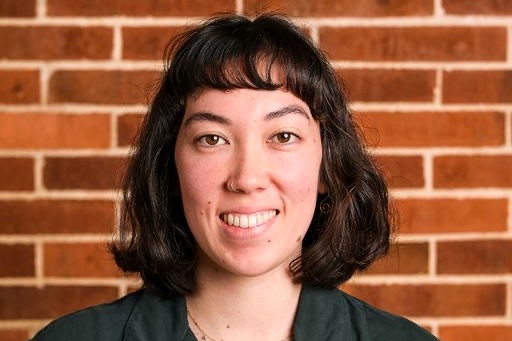Nicole Koyuki Golden, Ph.D. student in Writing and Rhetoric and Graduate Assistant Director of The Writing Center at Michigan State University, was awarded the International Writing Centers Association (IWCA) Future Leaders Scholarship in recognition of her significant contributions to the writing center community and her potential as a leader in the field of writing studies.
“I was honored to be selected for the award alongside several other phenomenal writing center leaders,” Golden said. “I deeply appreciate the recognition of my efforts in writing center contexts, and I hope to continue to push writing center studies to enact justice and community in increasingly inclusive ways.”

Golden’s experience working for writing centers spans nearly a decade. In that time, she has held roles as a consultant, embedded writing tutor, workshop facilitator, professional development lead, and graduate mentorship facilitator.
“I’ve grown both professionally and personally thanks to the supportive communities I’ve been part of,” she said.
Since joining MSU’s Department of Writing, Rhetoric, and Cultures in 2022, she has worked at The Writing Center and has played a vital role in shaping the center’s educational and professional development initiatives. She has facilitated the graduate consultant education program and led professional development meetings for staff, supporting more than 60 people. She also has taught Writing Center Theory and Practice (WRA 395), a course central to training undergraduate consultants that aims to advance scholarship in writing center pedagogy.
“I deeply appreciate the recognition of my efforts in writing center contexts, and I hope to continue to push writing center studies to enact justice and community in increasingly inclusive ways.”
Nicole Koyuki Golden
Now as Graduate Assistant Director, Golden continues to lead with passion and innovation, embracing new challenges and fostering collaborative learning environments. Her work is rooted in a steadfast commitment to understanding how institutional contexts shape writing centers and the opportunities they provide.
Golden’s short-term goals include enhancing inter- and cross-disciplinary institutional engagement and sharing insights through research. Long-term, she is dedicated to diversifying writing center scholarship by bringing marginalized voices to the forefront. Her achievements reflect a combination of expertise and a deep commitment to fostering inclusive and dynamic writing center spaces.
Golden’s recognition by the International Writing Centers Association showcases her dedication to advancing writing center work and her exceptional promise as a future leader in the field.

The IWCA Future Leaders Scholarship recognizes exceptional undergraduate and graduate students who demonstrate strong leadership skills and a deep interest in writing center studies. Recipients receive a cash award and are invited to engage with IWCA leaders at the annual conference, furthering their professional development. The 2024 conference that Golden attended, as the recipient of this award, took place in October. “Attending the conference invited me to continue mulling over the challenges many writing centers face as student populations and technologies evolve as well as to think more critically about liberatory practices and racial justice in my past and present writing center contexts,” she said.
Golden is a first-generation college student who is connected to various Asian Pacific Islander Desi American (APIDA) communities around campus. Her research centers around Asian American communities and rhetoric and digital community engagement. She has an M.A. in Writing and Rhetoric Studies from San Diego State University and a B.A. in English from Occidental College.
By Nicole Damron


